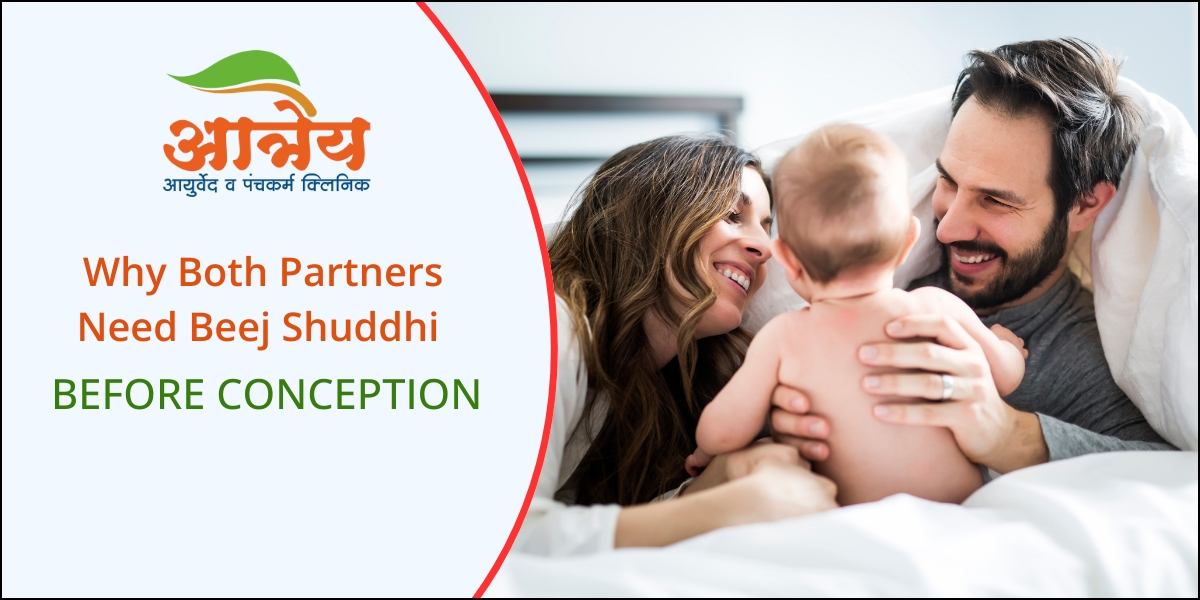In today’s world, fertility is often discussed only in terms of women’s health. However, Ayurveda clearly explains that both partners share equal responsibility in creating new life. The Charaka Samhita beautifully compares conception to the sprouting of a seed — a healthy plant grows only when both seed and soil are pure and nourished.
This is where Beej Shuddhi, the purification of the reproductive “seeds” (sperm & ovum), becomes essential. It is the first and most important step of the Beej Sanskar program.
What Is Beej Shuddhi?
Beej Shuddhi means the cleansing, strengthening, and refinement of the reproductive elements (Shukra Dhatu in men and Artava Dhatu in women). It ensures that the sperm and ovum are of the highest quality, free from toxins and imbalances, to form a healthy embryo.
Why Beej Shuddhi Is Needed for Both Partners
1. Male Partner – Shukra Shuddhi
In men, Shukra Dhatu forms the biological foundation of sperm. Stress, poor diet, alcohol, smoking, and late nights weaken its vitality. Shukra Shuddhi focuses on:
- Detoxifying reproductive tissues
- Improving vitality and stamina
- Enhancing the purity and strength of sperm
2. Female Partner – Artava Shuddhi
In women, Artava Dhatu governs ovum health and menstrual regularity. Hormonal disturbances, irregular sleep, and junk food create Ama (toxins) that affect ovulation. Artava Shuddhi focuses on:
- Cleansing uterine channels
- Restoring hormonal rhythm
- Improving egg quality and uterine receptivity
3. Why Both Matter
Ayurveda teaches that conception occurs when Rutu, Kshetra, Beeja, and Ambu are all pure. If either partner’s reproductive tissue is weak or toxic, conception or fetal development may suffer. Hence, Beej Shuddhi is a couple’s preparation, not an individual one.
Ayurvedic Steps for Beej Shuddhi
1. Panchakarma (Pre-Conception Detox)
Both partners undergo mild cleansing to remove deep-seated toxins and balance Doshas:
- Virechan – clears Pitta & liver toxins
- Basti – balances Vata, nourishes reproductive channels
- Uttar Basti – for uterine cleansing (in women)
(Done under Ayurvedic supervision before planning conception.)
2. Rasayana Therapy (Rejuvenation)
After detox, Rasayana nourishes all Dhatus, rejuvenates fertility potential, and builds Ojas — the essence of vitality that supports healthy conception.
3. Beej Shuddhi Diet
- Include: milk, ghee, soaked almonds, dates, walnuts, pumpkin & flax seeds, fresh fruits, moong dal, and ghee-based meals.
- Avoid: processed food, cold drinks, excess sugar, alcohol, and stale leftovers.
- Tip: Eat freshly prepared food and maintain proper meal timing.
4. Lifestyle Discipline (Vihara)
- Follow Dinacharya — regular sleep, meals, and exercise.
- Avoid smoking, alcohol, and late-night stress.
- Practice yoga asanas such as Vajrasana, Setu Bandhasana, Baddha Konasana.
- Meditate and maintain a positive mindset.
5. Ayurvedic Herbs (under expert guidance only)
- Ashwagandha
- Shatavari
- Gokshura
- Lodhra
Beej Shuddhi is not just a treatment — it’s a sacred preparation for life. By purifying the reproductive seeds of both partners, Ayurveda ensures the creation of a healthy, intelligent, and emotionally balanced child. The process builds a strong foundation for conception, pregnancy, and generations ahead.
For a personalized Beej Shuddhi & preconception program, contact Aatreya Ayurved Clinic at 9860007992.
FAQs on Beej Shuddhi
Q1. When should Beej Shuddhi begin?
Ideally 3–6 months before conception, so detox and rejuvenation are completed well in advance.
Q2. Can Beej Shuddhi help couples facing infertility?
Yes. It removes subtle blockages, improves sperm & egg quality, and balances hormones for natural conception.
Q3. Is Beej Shuddhi required if IVF is planned?
Yes. Ayurvedic cleansing enhances gamete quality and uterine receptivity, improving IVF/IUI success rates.
Q4. What if only one partner follows Beej Shuddhi?
Ayurveda insists on both partners participating to ensure genetic, physical, and emotional harmony in the child.
Q5. Is it safe for all age groups?
Yes, when done under Ayurvedic supervision. Therapies and diet are customized as per body type and health status.





